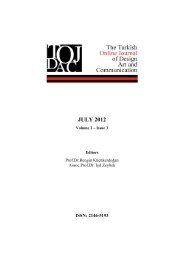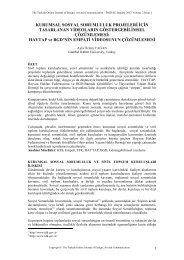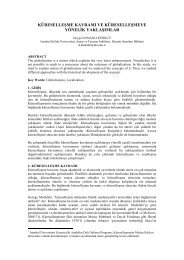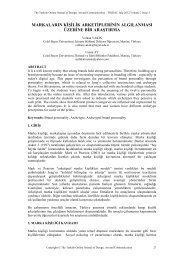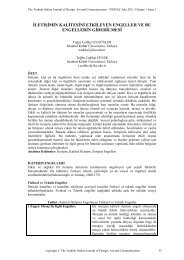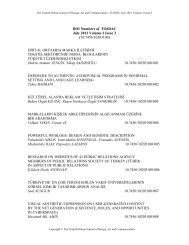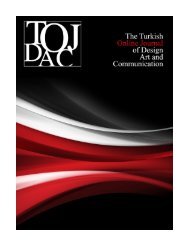aprıl 2012 - tojdac.org
aprıl 2012 - tojdac.org
aprıl 2012 - tojdac.org
Create successful ePaper yourself
Turn your PDF publications into a flip-book with our unique Google optimized e-Paper software.
The Turkish Online Journal of Design, Art and Communication - TOJDAC April <strong>2012</strong> Volume 2 Issue 2<br />
mobilization tool. Twitter was used in Kuwait to mobalize and <strong>org</strong>anize protests against the Prime<br />
Minister Sheikh Nasser AlMohammed Al Sabah that started on March 2011 and the increased<br />
political discussions on Twitter prove that Kuwaitis use social networking sites for political<br />
reasons (GetConnect, 2011). In addition, Twitter is increasingly being used as the most popular<br />
channel for political discussion among Kuwaiti citizens because of its wide audience reach,<br />
speed, and the short messages feature (Haqaq, 2011). Another factore that can’t be neglected is<br />
Kuwaitis ability to own smart phones due to their middle to high incomes that makes social<br />
networks accessible from their phones. Haqaq (2011) adds that the high number of people using<br />
smart phones in Kuwait helped in encouraging the use of social media such as Twitter and<br />
Facebook because people connect to these tools straight from their phones without the need to be<br />
sitting behind a laptop anymore. In her study about the Internet in Kuwait, Wheeler (2003)<br />
argued the Internet trasnformed the communicative practices in the Kuwaiti society. As the<br />
traditional social forum for political discussion and gatherings has always been the diwaniya<br />
(Male social clubs), where Kuwaiti men would gather to discuss issues, latest events, and debate<br />
about politics. (Haqaq, 2011). But the introduction of the Intenet has changed the diwaniya<br />
custom and many young people argue that they enjoy to surf the Net over traditional social<br />
gatherings. Social media tools became the new public forums for the new Kuwaiti generation as<br />
they use it for political discussion (Ismail & Mazeedi, 1998 & Haqaq 2011). Politicians, ministers<br />
and members of parliament MPs (law makers) in Kuwaiti have followed the trend and are using<br />
Twitter to discuss politics and interact with the public. AlQaseemi (2011) notes that social media<br />
in Kuwait is more like an extension of the Kuwaiti parliament, where parliament members discuss<br />
policies and interact with their followers from the general public. Wheeler (2001) believes that<br />
some Kuwaitis are taking advantage of the Internet as a vehicle for challenging Kuwait’s<br />
conservative society’s view on proper public interaction. The Internet supports the untraditional<br />
chains of authority, which provides an attractive experiment in which to interact with unfamiliar<br />
or endangerd forms of social interaction (Wheeler, 2001) Moreover, Haqaq (2011) argues that<br />
parliament members in Kuwait joined Twitter after they have noticed the shift in the political<br />
forums and the great participation. Social Media like Twitter is a great opportunity for parliament<br />
members and political figures to read conversation between the public, interact with general<br />
people, and participate in the people-government dialogue (Haqaq, 2011). AlMutairi (2011)<br />
asserts that Kuwaiti MPs’ usage of Twitter is a phenomena and they use it to interact with their<br />
followers and gain public support. In addition, MPs in Kuwait use Twitter messages to support<br />
their positions on policies and use it as an alternative source to mainstream media to reach out to<br />
their supporters especially when rumors spread about them or when they need to defend certain<br />
positions (AlMutairi, 2011).<br />
Members of parliament and politicians have different political agendas and might use the Internet<br />
and social media for different purposes. Ku et al., (2003) argue that politicians have begun to use<br />
the Internet to mobilize supporters and convery their messages through online strategies. When<br />
studying MPs in Kuwait, it is unfair to refer to them as one homogeneous group, as they belong to<br />
different political groups and have different political ideologies that range from Islamists to<br />
liberals. Therefore, this study analyzes MPs’ Twitter messages as part of their political groups to<br />
examine whether differences in leadership exist among political groups.<br />
Kuwait Political Groups<br />
Official political parties are illegal in Kuwait, they have not been legalized since the<br />
independence in 1961. Yet, the Kuwaiti 1962 constitution does not prohibit political parties in<br />
any of its articles. Nevertheless, there are several political groups that act as de facto political<br />
parties ( Encyclopedia of the Nations, 2011). The rational for prohibitting the existence of<br />
Copyright © The Turkish Online Journal of Design, Art and Communication<br />
125



